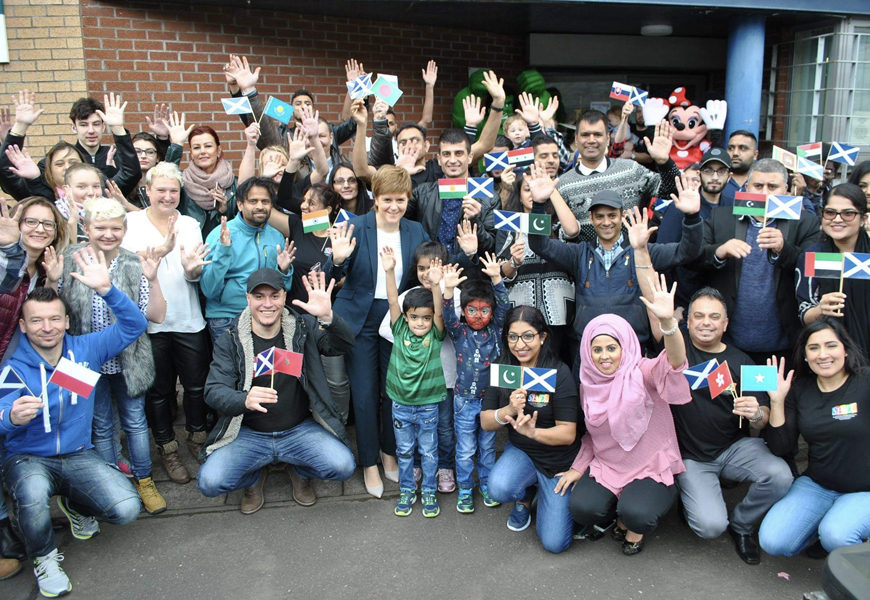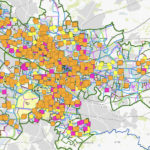Summary
Via the Global Majority Fund, the Coalition for Racial Equality and Rights was awarded £250,000, which they distributed amongst 17 organisations that support communities experiencing racial equality, to help fund delivery of COVID-19 recovery work.
Making A Difference
In total, approximately 7850 people from communities experiencing racial inequality are being supported by the 17 organisations in receipt of funding. Funded Partners have written case studies which were submitted to Comic Relief to demonstrate the impact of the funding and will be providing regular financial, narrative, and monitoring reports to CRER.
In February 2021, the Coalition for Racial Equality and Rights (CRER) was one of ten organisations around the UK to be awarded a portion of the second phase of the Global Majority Fund. This fund aims to address the inequalities faced by Black and minority ethnic charities working to adapt their services in the wake of the COVID- 19 pandemic by targeting services for the most at-risk communities. The £2.8m fund includes contributions from Barclays, as part of the NET’s Coronavirus Appeal, Esmée Fairbairn Foundation, The Clothworkers’ Foundation and Comic Relief. CRER designed an application process to distribute £250,000 in grants to community organisations working across Scotland who are led by and/or working with communities and individuals facing racial inequalities.
The article below, provided by colleagues at CRER, details the timeline of the funding process from initial application to work commencing, how CRER distributed the fund amongst the organisations that applied, and lists the successful organisations with a summary of their proposed COVID-19 recovery work.
Timeline of funding process
- CRER applied for the Global Majority Fund from Comic Relief in November 2020
- CRER received funding from the Global Majority Fund in January 2021
- CRER organised and delivered a research phase in April 2021
- CRER launched a funding application in mid-May 2021 with the application deadline in mid-June 2021
- CRER held two webinar sessions at the beginning of June 2021
- CRER scored applications and made funding decisions in July 2021
- Funded Partners began their work in July and August 2021
Overview of funding process
Survey:
We started with a research process via a short SurveyMonkey survey to gather information on what BME organisations located and operating in Scotland have been doing over the last year to support the communities and individuals they work with, to find out what they would do with funding if awarded a grant, and to gather information on any new and smaller organisations we may not have been aware of to ensure information about this fund was circulated as widely as possible. In total, we received 79 responses in total from charitable organisations located in and working around Scotland.
Application process:
After completing the research process, we launched the application in mid-May with a deadline of mid-June. We aimed to keep the process as simple and accessible as possible and held two webinar sessions for interested applicants to learn more about the fund and to ask questions. Organisations could apply for a small grant of up to £5,000 or for a large grant up to £20,000. In order to apply and be considered for a grant, organisations needed to complete and submit an application before the deadline and provide supporting documentation.
In total, 90 organisations applied for funding (totalling over £1.3 million) and 17 organisations received grants. This was an extremely oversubscribed grant and the type of work proposed in each application shows that more funding is needed for BME organisations working in Scotland to continue operating and supporting their service users.
Grant making:
This funding supports a variety of communities experiencing racial inequality in Scotland and supports people of all ages. In total, approximately 7850 people from communities experiencing racial inequality are being supported from the 17 organisations in receipt of funding.
The following lists the successful organisations, or Funded Partners, who received funding and a short description of their proposed COVID-19 recovery work. Those who are highlighted work within the Greater Glasgow and Clyde Health Board area.
- African Caribbean Women’s Association (ACWA) – Training members on mental health and wellbeing for them to offer peer-to-peer support on a long-term basis.
- Amina – the Muslim Women’s Resource Centre – Appointing a specialist caseworker to provide support to women with complex needs in crisis.
- Community InfoSource – Appointing a specialist caseworker and buddy volunteer coordinator to work with asylum seekers, particularly those in / transitioning out of Glasgow’s temporary hotel accommodation.
- Central Scotland Regional Equality Council (CSREC) – Provision of mental health services to BME people in the Forth Valley, including mental health counsellors and interpreters.
- Edinburgh and Lothians Regional Equality Council (ELREC) – Provision of mental health and culturally-sensitive services to BME communities in Edinburgh and the Lothians, including people with no recourse to public funds.
- Jambo! Radio – Provision of volunteering and training opportunities for young people as a pathway to employment; supporting the newly unemployed in employability and digital skills training using broadcast production tools and processes; supporting the digital skills of women going through the asylum and immigration system in Glasgow and Renfrewshire; and supporting trainees and volunteers.
- Maryhill Integration Network – Organising activities, volunteer opportunities and training to support those most affected by the pandemic and offering accessible, culturally sensitive and needs-led participation in community activities.
- Networking Key Services – Supporting South Asian and other BME older people (especially men living alone) facing social isolation and lack of emotional support and advice; supporting women and children at the risk of domestic abuse and economic hardships (some with no recourse to public funding).
- Perth and Kinross Association of Voluntary Service (PKAVS) – Researching the range of free and/or low-cost food points across Perth and Kinross, collating the data and working with a graphic facilitator to design an engaging and accessible map of the area, with key contact details and access information and translated into 6 languages.
- Pollokshields Development Agency (PDA) – Establishing a youth forum for young people in Pollokshields/Govanhill, Glasgow, to improve mental health by beginning to re- establish social bonds and a sense of meaning and autonomy within the community they live in.
- Saheliya – Appointing language support workers with 9 languages to support intake
assessment of marginalised and traumatised BME women referred to Saheliya’s services.
- Scottish Ethnic Minority Deaf Club – Developing the provision of a bespoke Welfare Rights service to aid in the recovery of Deaf minority ethnic BSL users who have been adversely affected by the pandemic and who need to be able to re-integrate into daily living and retain ownership of their own individual situation.
- Sikh Sanjog – Providing culturally sensitive mental health and well-being support though free and accessible services, creating a women’s group to combat isolation and to access educational and training opportunities, and employing mental health professionals.
- Sikhs in Scotland – Creating a Community Advocacy Support hub and recruiting new volunteers to support a multilingual helpline service.
- The Well Multi-Cultural Resource Centre – Setting up a Life Skills programme to increase wellbeing and employability with bespoke training for each participant.
- Universal FC – Creating employment and training opportunities through mainstream sport for refugees from African and Caribbean communities.
- Wing Hong Chinese Elderly Centre – Supporting elderly Chinese service users to combat malnutrition, social isolation, and loneliness as a result of COVID-19.
Some examples of the communities being supported include:
- Refugees, asylum seekers, and people with no recourse to public funds
- Vulnerable BME women and girls at risk of and experiencing domestic violence and abuse
- Elderly and older people at risk of or experiencing malnutrition
- BME people of a variety of ages and from a variety of communities with mental health needs
- Young people experiencing barriers to employment or who have recently become unemployed
- Older BME people with low digital literacy and in isolation
- BME migrant and seasonal workers
- Young people from Sikh and Muslim backgrounds living in the some of the most deprived areas of Glasgow
- Disabled minority ethnic people
Monitoring:
We are now taking on a monitoring role and checking in with Funded Partners to discuss their work so far and work through any challenges that arise. Funded Partners have written case studies which were submitted to Comic Relief to demonstrate the impact of the funding and will be providing regular financial, narrative, and monitoring reports to CRER.
Enquiries about the Global Majority Fund can be directed to Yasmin Luqman at yasmin@crer.org.uk.
About CRER: The Coalition for Racial Equality and Rights (CRER) has been working to eliminate racial discrimination and promote racial justice across Scotland for 20 years. Through research and campaigning activities which respond to the needs of communities, our work aims to tackle deep rooted issues of racial inequality.



